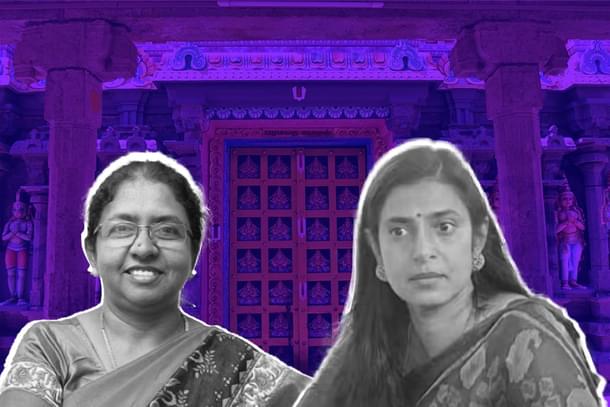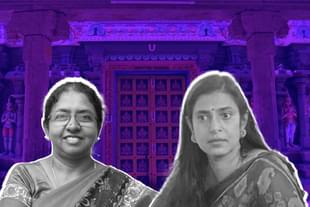States
Two Speeches, Two Different Reactions: How Dravidianism Has Managed To Normalise Selective Outrage In Tamil Nadu
Aravindan Neelakandan
Nov 26, 2024, 02:57 PM | Updated 02:56 PM IST
Save & read from anywhere!
Bookmark stories for easy access on any device or the Swarajya app.


The recent arrest of actor Kasturi Shankar in Andhra Pradesh for remarks she made about the Telugu community has sparked significant controversy.
Shankar was taken into custody by a special police force and brought before a Chennai court, which remanded her to judicial custody until 29 November. Though she was subsequently released on bail with court intervention, the incident highlights a disturbing trend of selective outrage and legal action in Tamil Nadu, particularly concerning issues of caste and community.
While Shankar's comments may have been inelegant and perhaps even offensive to some, they arguably did not cross the line into hate speech.
It is crucial for a healthy democracy, to distinguish between unpopular and even false and offensive opinions and genuine incitement to violence and hatred.
Will she get arrested like kasturi?
— Iswarya Mohan (@IswaryaMohan7) November 20, 2024
pic.twitter.com/WiRwxEV1GQ
In stark contrast to the swift action taken against Shankar, a video has surfaced of a Dravidianist speaker named Oviya making derogatory remarks about the Devendrakula Vellalar community which as of now belongs to a Scheduled Caste group.
Oviya's comments, which link the community's name to the children of concubines, clearly constitute hate speech and are punishable under the Protection of Civil Rights (PCR) Act.
This raises several troubling questions:
--Why has Oviya not faced any legal repercussions for her hateful and offensive speech - that is qualitatively more demeaning than that of Kasturi?
--Why has the mainstream media, which extensively covered Shankar's case, remains silent on Oviya's perversely hate-filled speech?
--Why have YouTubers and journalists who eagerly pursued interviews with Shankar, often tending towards lynch-mob journalism, not shown the same interest in holding Oviya accountable?
These inconsistencies point to a troubling double standard in Tamil Nadu, where even perceived criticism of certain communities is met with swift condemnation and legal action, while hateful rhetoric targeting other communities, particularly when they anchor themselves strongly with their Hindu identities, is often ignored or treated with softest of the gloves possible.
The hatred displayed by Ovia in her speech targeting the identity-claim of Devendrakula Vellalars was not random. It is not just the sacred threads of the Brahmins that the Dravidianists hate. They also viscerally hate the sacred threads which connect every marginalised community proudly to the spiritually rich Hindu tradition.
It is a tragedy that any community should be forced to view itself solely through the lens of oppression, their history reduced to a narrative of suffering, their saviours limited to those who exploited their pain for political gain, the British colonisers and the pro-British Dravidianists.
The very notion that the community named as 'Pallar', should be denied the dignity of its ancestral name, Devendrakula Vellalar, is an anathema to the spirit of truth and justice. But that forms the basis of Dravidianist world-view. Devendra is the name of the Divine in the Vedic literature.
The obscene utterances of Oviya have a logical relation to the pseudo-rational and racist world-view of E.V. Ramasamy. It is a calculated insult aimed at a community simply for reclaiming its rightful place of honour in society.
This selective approach to justice undermines the principles of fairness and equality before the law. It also creates a chilling effect on free speech, as individuals may fear expressing opinions that could be deemed offensive by certain groups while obscenities against other communities, particularly Brahmins and SC and ST are allowed.
This points to a deeply disturbing worldview rearing back its head.
While the extent of persecution faced by Brahmins in Tamil Nadu may not mirror the historical atrocities endured by Scheduled Communities, the anti-Brahmin rhetoric employed by an increasingly radical proponents of Dravidianism bears an unsettling resemblance to the ideology of Nazi Germany. While the violence against Brahmin community has not reached the level of violence against the SC, the vilification of Brahmin community by the Dravidianist discourse is very much Nazi in its core.
Dravidianism, however, distinguishes itself from Nazism in two key ways:
--Firstly, it cloaks its prejudice in the language of social justice, making it more insidious and potentially dangerous. By masking its hatred as pursuit of equality, it gains mainstream acceptance and avoids the overt stigma associated with traditional forms of bigotry.
--Secondly, Dravidianism has not been able to incite the same degree of violence against Brahmins as the Nazis did against Jews. This is largely due to the inherent pluralism of Hindu culture, which, despite its flaws, has historically fostered diversity and self-reflection. Unlike the deeply ingrained anti-Semitism within Christendom, Hinduism's capacity for introspection has acted as a natural check against the escalation of hatred.
However, the inability of Dravidianism to achieve its full destructive potential does not diminish its inherent danger. The ideology's insidious nature and potential for future violence remain a cause for concern. The current events around Kasturi Shankar and Ovia, the differential treatment with respect to an offensive speech by the former and a perverse speech by the latter, shows an anti-Brahmin apartheid system slowly getting into place.
Unwittingly, Shankar in her speech made quite a constructive suggestion, that seems to have been overlooked. The Shankar incident underscores the urgent need for a non-governmental legal task force in Tamil Nadu to combat hate speech against all communities, particularly those belonging to the Hindu Dharma.
This task force should work to ensure that all individuals, regardless of their background or beliefs, are protected from hateful rhetoric and discrimination.
It's time for Tamil Nadu to uphold the values of inclusivity and justice for all its citizens. Selective outrage and legal action only serve to deepen divisions and erode trust in the system.





